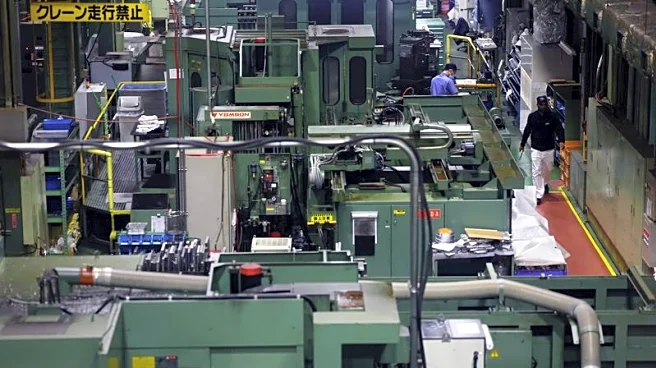By Leika Kihara
TOKYO (Reuters) -Factory activity shrank in most of Asia's major economies in September, private surveys showed on Wednesday, as signs of a slowdown in U.S. growth and the expected impact
of President Donald Trump's tariffs added to pressure from weak Chinese demand.
The stress on manufacturers highlights the challenge Asian policymakers face in protecting the export-reliant region from higher U.S. levies, a key policy of the Trump administration that has upended the global trade order and put the brakes on economic growth.
Export powerhouse Japan and global tech hub Taiwan saw manufacturing activity shrink in September, the surveys showed, leaving businesses in Asia - heavily reliant on the U.S. market - on a fragile footing.
Worryingly, China, a key engine of the global economy, also remained in the doldrums.
An official survey released on Monday showed manufacturing activity in the world's second-biggest economy contracted for a sixth month in September, dragged down by weak consumption and the squeeze from U.S. tariffs.
The prolonged slump underlines the twin pressures on China's economy: domestic demand has failed to mount a durable recovery in the years since the pandemic while Trump's tariffs have squeezed Chinese factories as well as overseas firms that buy components.
"The September PMI readings for most countries in Asia remained weak and we continue to expect manufacturing activity in the region to struggle in the near term," said Shivaan Tandon, emerging markets economist at Capital Economics.
"With growth set to soften and inflation likely to remain contained, we expect central banks in Asia to loosen policy further."
The S&P Global Japan Manufacturing purchasing managers' index (PMI) fell to 48.5 in September from 49.7 in August, staying below the 50.0 threshold that separates growth from contraction. It shrank at the fastest pace in six months due to steep falls in output and new orders, the survey showed.
"Overall, the data indicate that unless we see a notable improvement in demand at home and overseas, it's likely the sector will struggle to see much growth in the near-term," said Annabel Fiddes, Economics Associate Director at S&P Global Market Intelligence, on Japan's PMI.
Taiwan's manufacturing PMI fell to 46.8 last month from 47.4 in August. Factory activity also shrank in the Philippines and Malaysia, the private surveys showed.
By contrast, South Korea's factory activity expanded for the first time in eight months in September underpinned by improving overseas demand.
Manufacturing PMI in Asia's fourth-largest economy, released by S&P Global, rose to 50.7 in September from 48.3 in August, moving above the 50-mark for the first time since January 2025.
The outlook for South Korea's exporters, however, hinges on negotiations to formalise a July deal aimed at reducing U.S. tariffs on Korean imports, including automobiles, to 15% from 25%, in return for South Korea's investment of $350 billion in the U.S. The talks have stalled due to Seoul's concerns over foreign exchange implications.
(Reporting by Leika KiharaEditing by Shri Navaratnam)









